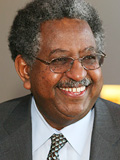
Haile Debas
The University of California is working toward the unprecedented step of establishing an interdisciplinary, solution-seeking school of global health with Haile Debas, MD, executive director of UCSF Global Health Sciences, as one of its major champions.
Debas, UCSF chancellor emeritus and former dean of the School of Medicine, recently updated the campus community on the progress and plans for the UC School of Global Health, an ambitious undertaking that he described as a "bold if not audacious plan."
"UC can mobilize the phenomenal expertise of the 10 campuses, which are uniquely capable to become a leader in global health," Debas said.
The school's mission is to focus on producing leaders and practitioners of global health, conducting innovative and important research and developing international collaborations for addressing health disparities to improve the health of vulnerable people in California and worldwide, Debas explained.
What's envisioned is establishing a UC school with a central administrative dean's office and five or six interdisciplinary centers of expertise at different UC campuses. Centers of expertise could be those dedicated to maternal and child health, neglected diseases and global warming, for example.
The school would offer master's and PhD degrees initially, although undergraduate programs could be added later. The centers of expertise would be linked through state-of-the-art information and communications systems so that faculty, staff, students and their global partners could stay connected. Seminars and lectures by faculty drawn from UC and around the globe would be accessible to all campuses, Debas said.
Campuses would have an opportunity to propose what kinds of centers of expertise to establish in a UC-wide competition that will be judged by an external committee of experts who would make the final selection. These centers would be subject to a sunset provision after 10 years unless they successfully compete for renewed resources.
The plan has received enthusiastic support from faculty and leaders throughout the 10-campus system, as well as a planning grant from the UC Office of the President (UCOP), Debas said.
True to UC form, several committees have been meeting to shape the proposal - the Senior Advisory Committee (SAC), the All Campuses Planning Committee (ACPC) and an external scientific advisory committee. Members of the SAC include one chancellor, five vice chancellors and faculty representing 16 deans and disciplines from across the 10 UC campuses. ACPC members include faculty representing 27 areas of expertise across all 10 campuses.
The fast-track timeline for the school calls for drafting a proposal by June, submitting it for review by the Academic Senate until August and finalizing the plan by October 2008, according to Debas.
Catalyst for Change
UCSF is serving as a major catalyst for the UC School of Global Health, since its own Global Health Sciences (GHS) has flourished since its founding by Chancellor Mike Bishop, MD, in 2003. UCSF currently has many active projects in scores of countries throughout the world, representing all four of its professional schools, the basic science departments, and specialized interdisciplinary units such as the Institute for Global Health.
GHS continues to forge new relationships for training and research, many of which are driven by UCSF students who are keenly interested to share their knowledge with the wider world and to learn from other societies and cultures.
For his part, Debas is rallying support for the UC school by talking to UC and UCSF officials, private industry leaders, venture capitalists, donors and others to maintain momentum and mobilize financial support. The University will need considerable public and private support to make the school a reality, he noted.
While Debas initially thought that the timing of creating a new school may be off since the economy - on the brink of a recession - could limit investments, he has since been reassured. On the contrary, he's been told by industry leaders that this is precisely the time to pursue great ideas and plans for the future.
The idea for a systemwide approach to global health began when UCOP appointed a Long-term Guidance Committee, which was charged to look at opportunities for the University to excel and expand over the next two decades. To be successful, UC, as well as other academic institutions, must have a global reach, the committee found.
In late 2006, UC Provost Wyatt "Rory" Hume, DDS, PhD, executive vice president for academic and health affairs at UCOP, appointed an exploratory committee with membership from all 10 campuses to forward recommendations on how the University could advance its impact worldwide. The committee, of which Debas was a member, reached the unanimous decision to recommend that UC develop a global health initiative that encompasses all campuses and many disciplines.
UC's global outreach, the committee concluded, should focus on educating and training the next generation of leaders and practitioners of global health and on addressing health disparities to improve the health of people worldwide.
The challenges of global health are immense: poverty, pandemic diseases, neglected and chronic diseases, and climate change - all of which pose serious health risks to humanity, Debas noted.
Key to the school is setting up administrative headquarters, which Debas hopes will be located on one of the few remaining spots at UCSF Mission Bay. The campus, enlarged by 14.5 acres for the site of the future medical center at Mission Bay, has only about five places left on the original 43-acre campus for new buildings.
Photo/Elisabeth Fall
Related Links:
Global Health Sciences
advancing health worldwide™

